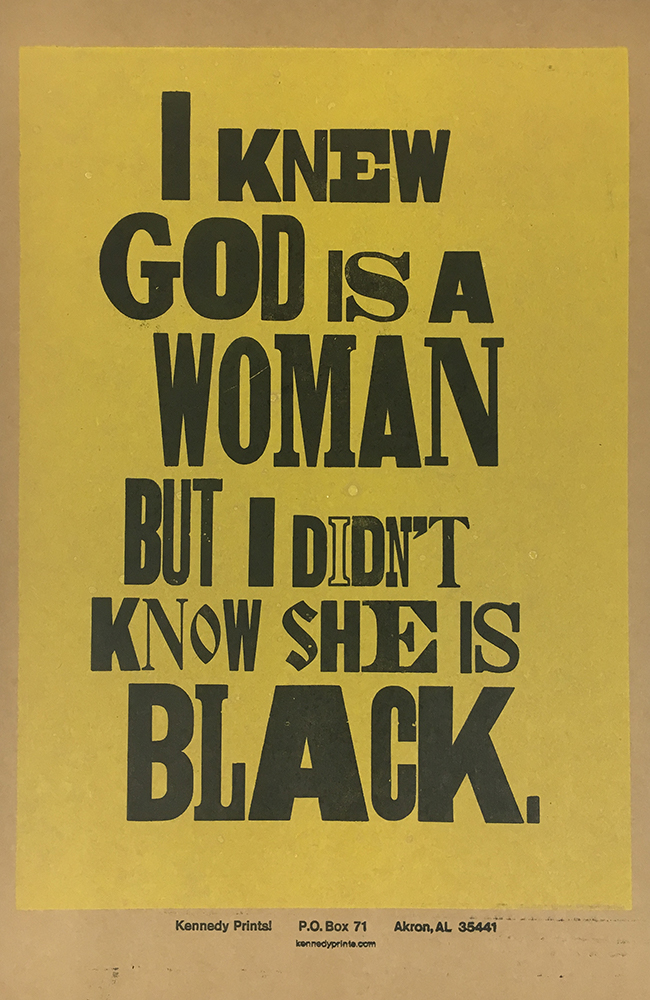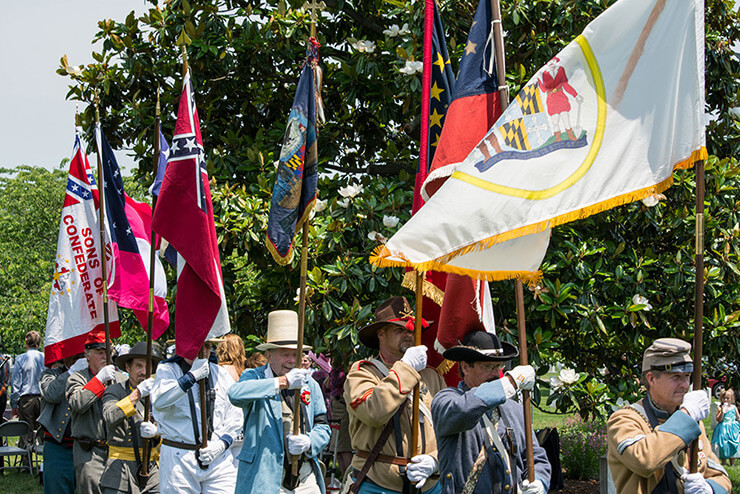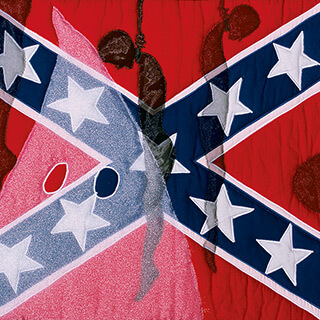Overview
A prophetic Black voice from the mid-nineteenth century calls out Trump's presidential hypocrisy.
O'er this wide extended country, Hear the solemn echoes roll, For a long and weary century, Those cries have gone from pole to pole; See the white man sway his sceptre, In one hand he holds the rod— In the other hand the Scripture, And says that he's a man of God. —Joshua McCarter Simpson

A freeborn Black abolitionist from Ohio, Joshua McCarter Simpson opened his 1854 indictment of the hypocrisy of Christian supporters of slavery, "To the White People of America," with searing words that echo across the centuries. Simpson's poetic voice resonated when Donald Trump strode through Lafayette Park for a photo opportunity—an image of him holding a Bible in front of St. John's Episcopal Church—moments after DC police, reinforced by National Guard troops, dispersed peaceful protesters who had gathered to demand that government leaders address systemic racism.
Simpson published "To the White People of America" in his collection The Emancipation Car, Being an Original Composition Of Anti-Slavery Ballads, Composed Exclusively For the Under Ground Rail Road (1854), written for abolitionists ferrying enslaved people to freedom. The Emancipation Car includes forty-three poems, all meant to be sung to then-popular tunes, and a few prose passages. The title of Simpson's collection extends the metaphor of the Underground Railroad, where these songs were popular among the formerly enslaved and where Simpson served as a conductor. In 1874 the collection was reprinted with its prose passages reworked in verse and a new appendix featuring poetic commentaries on the Fifteenth Amendment, the Underground Railroad, and related topics.

Simpson was born around 1820 in Windsor, Ohio, in the far northeastern corner of the border state, near Lake Erie. He was indentured as a servant from his childhood until he turned twenty-one, working in brutal conditions for a stonemason and later a farmer. He then taught himself to read and write, attended the Oberlin Collegiate Institute from 1844 to 1848, and moved to Zanesville in central Ohio, where he became an herbal doctor and grocer. Simpson gradually embraced abolitionism during his servitude and became a fierce advocate for emancipation thereafter. In his preface to The Emancipation Car, Simpson explains, "As soon as I could write, which was not until I was past twenty-one years old, a spirit of poetry, (which was always in me,) became revived, and seemed to waft before my mind horrid pictures of the condition of my people, and something seemed to say, 'Write and sing about it—you can sing what would be death to speak.' So I began to write and sing."1Joshua McCarter Simpson, "Note to the Public," in The Emancipation Car, Being an Original Composition Of Anti-Slavery Ballads, Composed Exclusively For the Under Ground Rail Road (1874; repr., Miami: Mnemosyne Publishing Co., 1969), vi. He first publicly performed an anti-slavery song in 1842 and published a collection of thirteen poems titled Original Anti-Slavery Songs in 1852. Simpson died in 1876.
Joshua McCarter Simpson's writing is remarkable for its force, conviction, moral clarity, and emotional depth. His poems are also frequently witty, both in their turns of phrase and in their relationship to the popular tunes with which Simpson chose to pair them. Simpson notes that "To the White People of America" should be sung to the tune "Massa's in the Cold, Cold Ground," a blackface minstrel tune composed by New York songwriter Stephen Foster in 1852, just two years prior to the publication of The Emancipation Car. In dialect, Foster's song depicts enslaved people crying as they mourn the death of their former owner, rendering Simpson's ironic appropriation bitingly clever. "In my selection of 'Airs,'" writes Simpson, "I have gathered such as are popular, and extensively known. Many superstitious persons, and perhaps many good conscientious, well-meaning Christians, will denounce and reject the work on account of the 'Tunes,' but my object has been to change the flow of those sweet melodies (so often disgraced by Comic Negro Songs, and sung by our own people,) into a more appropriate and useful channel."2Simpson, "Note to the Public," v–vi.
Despite his groundbreaking creativity, Simpson is little known today. Few scholars have written about his work, and he has never been the subject of a biography. I learned about Simpson when music bibliographer Erin Fulton included The Emancipation Car in the "Checklist of Southern Sacred Music Imprints, 1850–1925" that she compiled for the Sounding Spirit publishing initiative. Fulton turned to The Emancipation Car as Sounding Spirit searched for words from historical composers and hymnwriters in expressing our solidarity with Black Lives Matter protests in the wake of the murder of George Floyd and many others.

Reading Simpson's words from 1854 immediately conjures the image of Trump at St. John's Church:
"To the White People of America"
Air—"Massa's in the Cold, Cold Ground"
O'er this wide extended country,
Hear the solemn echoes roll,
For a long and weary century,
Those cries have gone from pole to pole;
See the white man sway his sceptre,
In one hand he holds the rod—
In the other hand the Scripture,
And says that he's a man of God.
Hear ye that mourning?
'Tis your brothers' cry!
O! ye wicked men take warning,
The day will come when you must die.
Lo! Ten thousand steeples shining
Through this mighty Christian land,
While four millions slaves all pining
And dying 'neath the Tyrant's hand.
See the "blood-stained" Christian banner
Followed by a host of saints (?)3Question mark appears in the original.
While they loudly sing Hosannah,
We hear the dying slave's complaints:
Hear ye that mourning?
Anglo-sons of God,
O! ye Hypocrites take warning,
And shun your sable brothers blood.
In our Legislative members,
Few there are with humane souls,
Though they speak in tones of thunder
'Gainst sins which they cannot control,
Women's rights and annexation,
Is the topic by the way,
While poor Africa's sable nation
For mercy, cry both by night and day.
Hear ye that mourning?
'Tis a solemn sound,
O! ye wicked men take warning,
For God will send his judgment down.
Tell us not of distant Island—
Never will we colonize:
Send us not to British Highlands,
For this is neither just nor wise,
Give us equal rights and chances,
All the rights of citizens—
And as light and truth advances,
We'll show you that we all are men.
Hear ye that mourning?
'Tis your brothers sigh,
O! ye wicked men take warning,
The judgment day will come by and by.
About the Author
Jesse P. Karlsberg is the senior digital scholarship strategist at the Emory Center for Digital Scholarship. He is the project director and editor-in-chief of Sounding Spirit, a research lab and publishing initiative promoting collaborative engagement with historical American songbooks. Karlsberg is an internationally recognized singer, teacher, composer, and songbook editor in the Sacred Harp tradition.
Recommended Resources
Text
Eaklor, Vicki L. American Antislavery Songs: A Collection and Analysis. New York: Greenwood Press, 1988.
———. "The Songs of The Emancipation Car: Variations on an Abolitionist Theme," Bulletin of the Missouri Historical Society 36 (January 1980): 92–102.
Ramey, Lauri. A History of African American Poetry. Cambridge, UK: Cambridge University Press, 2019.
Spencer, Jon Michael, ed. "Unsung Hymns by Black and Unknown Bards." Black Sacred Music 4, no. 1 (1990).
Web
Library of Congress. "Songs Related to the Abolition of Slavery." Accessed June 30, 2020. https://loc.gov/item/ihas.200197383.
Simpson, Joshua McCarter. "Printed Lyrics to Several Anti-Slavery Songs Composed by Dr. Simpson." Missouri Historical Society. Accessed June 30, 2020. http://collections.mohistory.org/resource/221476.
Willis, John and Tim Foran. "'I'm On My Way to Canada': Canada and Musical Protests Against Slavery." Canadian Museum of History Blog, February 20, 2015. https://www.historymuseum.ca/blog/im-on-my-way-to-canada-canada-and-musical-protests-against-slavery/.
Similar Publications
| 1. | Joshua McCarter Simpson, "Note to the Public," in The Emancipation Car, Being an Original Composition Of Anti-Slavery Ballads, Composed Exclusively For the Under Ground Rail Road (1874; repr., Miami: Mnemosyne Publishing Co., 1969), vi. |
|---|---|
| 2. | Simpson, "Note to the Public," v–vi. |
| 3. | Question mark appears in the original. |







